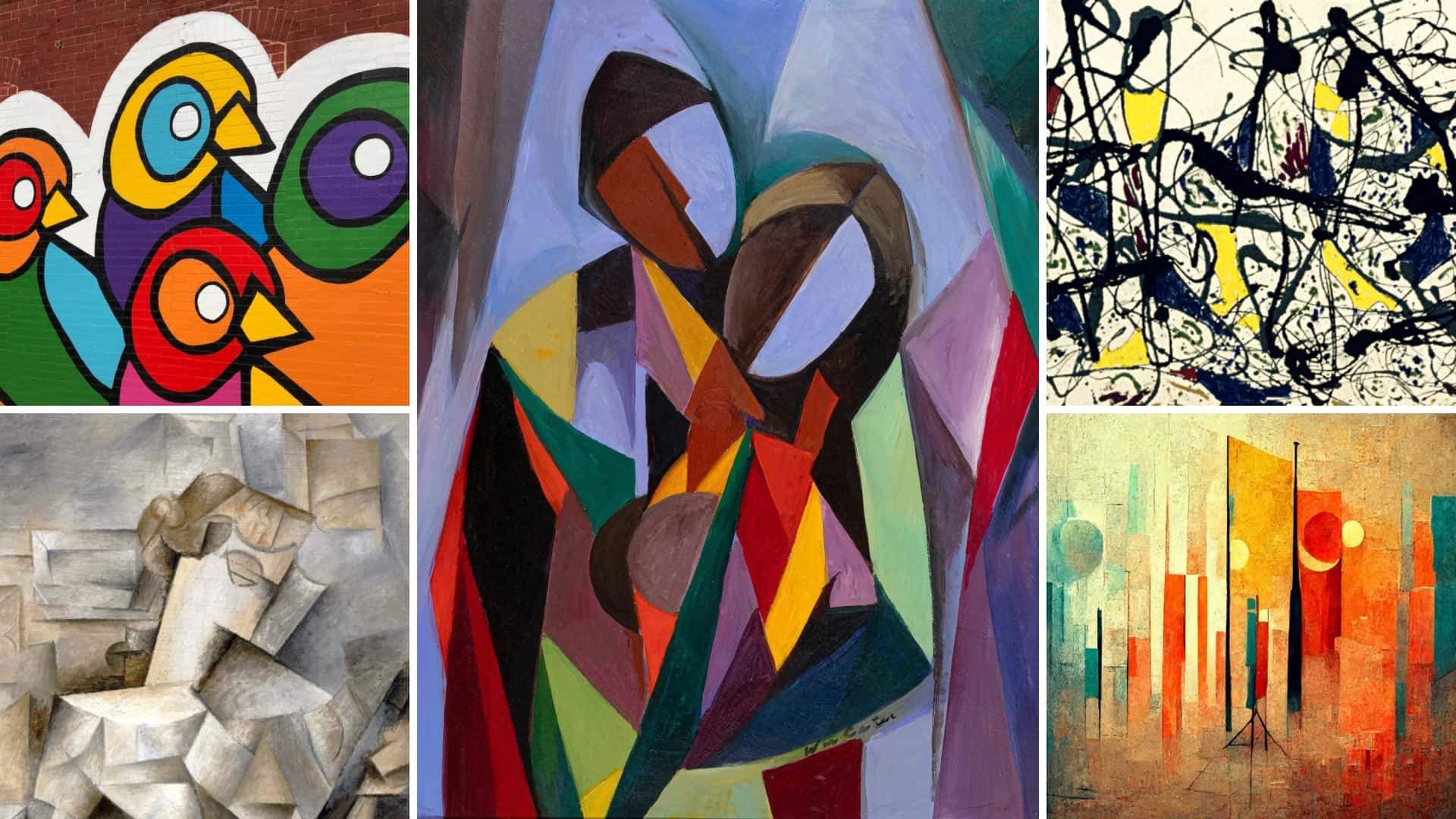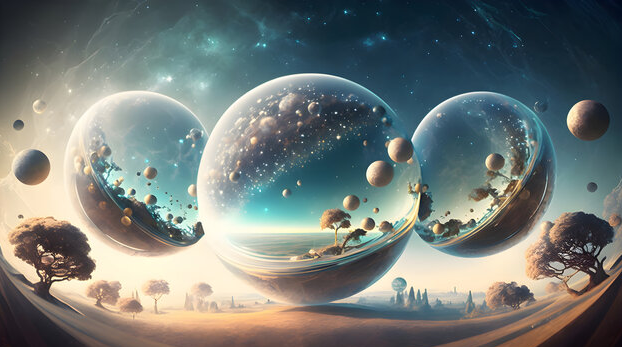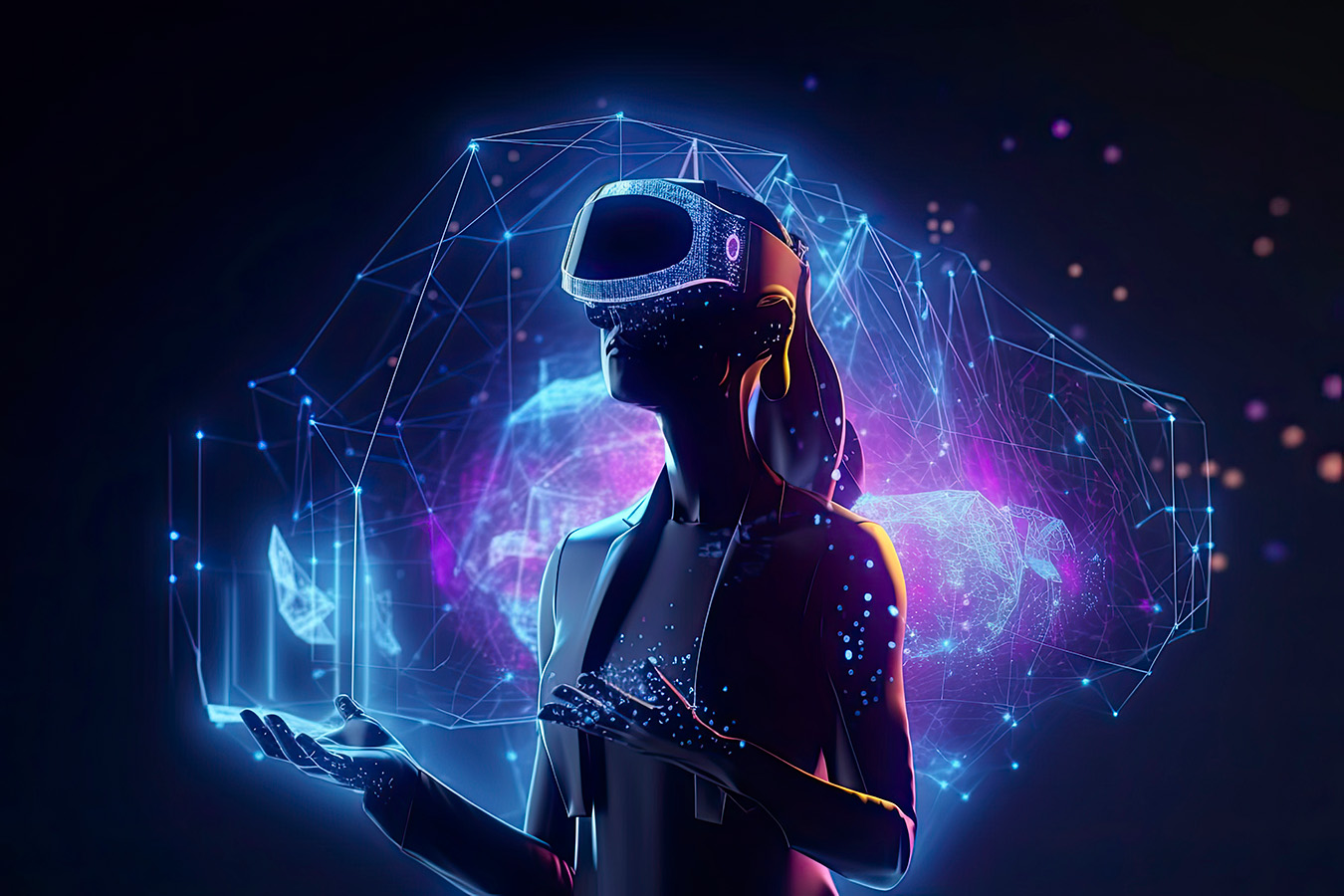and the distribution of digital products.
DM Television
Metaverse 0, 2.0, 3.0: How Do I See Our Future of Interaction?
Metaverses - a synergy of technical capabilities, fantasy, and art. But in order to understand it more voluminously, let's start with universes in principle - parallel worlds - “reflections of reality” that have always existed.
\ ==Art. For a complete picture, it is important to understand what I mean by it, why it is, and what it gives a person all the way through.==
\ Let's lay it out utilitarian at once. I distinguish 4 purposes:
\
To capture some information for easier transmission to others. It's cave paintings, it's the first stories, it's even the creation of language and writing as a tool for communication and transmission of everything between people. The very essence of art. We transmit pure information, messages, or stories through all its forms.
\
Creating another world according to your rules, an imagination where you can escape from the surrounding reality or augment/change it with your creativity. The desire to create what is not there: this is precisely the home of worlds, futurism, experiments of looking at the world and interpreting it. Humanity has always lacked what it has by default, as we have imagination and an eternal thirst for the new ==(hopefully, it won't lead us to a wondrous new world in our race for the surprisingly new)==.
\
Self-reflection is the self-expression of an inner state for relief and self-understanding, which is a psychological necessity, a therapeutic transfer of experience from thought into something denouncable to the psyche. Often into a table, often without purpose or utilitarian idea, often disjointed fragments of manifestation. In fact, this is one of the abilities of art. I mean self-discovery of our feelings, states, and what is happening inside us through formulation in art or the perception of something already created and recognizing ourselves in it.
\
Purposeful art is aimed at a utilitarian solution, which primarily solves a functional problem. It can be both production design with the invention of the chair, its comfort, stability, durability of design, and creation for greatness, beauty, imprinting power, and opportunities through the creators in past centuries.
\ Today, this can include marketing directions, including getting the image and leadership positions in the competitive race for the sake of consumer attention and, therefore, profit. Through what? Through the design of everything that surrounds us, through photography, video, songs, flavors. And this is all art with a primary functional task.

\ In general, according to Wikipedia, art is a form of human self-realization through sensual and expressive means. We don't know exactly what art is and what it is not because it combines a huge number of ways of expressing the author's idea. It is the very first way for people to interact with each other and the primary way to interact deeply, to show what they think, how they see the world, and what else exists within them. Let's put a mark in our memory here and come back again.
\ In art, every image, feeling, story, detail, and action contains information, ideas, and even a reflection of the current reality and personality of the creator himself by default. There, the creator controls everything and creates from scratch based on how he sees it. Every item is not random and has its own role and idea.
\ This is the only world where blue curtains are not blue curtains. It could be the pain of people and an entire generation. Pain experienced and invested by one person. These blue curtains contain not only the true idea of the author and his real world but also many interpretations by each viewer/reader, where each will see his own depending on his experience, knowledge, feelings, state, and current reality.
\ In this case, the purpose of the product of creativity may not be violated. It will be achieved through feelings, thoughts, and inner discoveries in the consumer's real life. Here, it is therapeutic through art in all its glory.
\ It is a mold of the reality of people of a certain time, geography, and generation. It is the imprint of everything at once: needs, pains, fears, desires, audience's thinking, and worldview. That's why it hits the heart and resonates at full volume when it finds its audience. If here, it is secondary because the main task of the creator is to express his vision. In marketing, it's exactly the opposite. In fact, art is a great library of pre-analysis, strategic presetting, and working with the audience.
Okay, What About Parallel Realities?\

\ Each manifestation of art immerses us in its own reality. ==First, we are inside the world of Hogwarts, then sitting on a couch with Flannery O’Connor and watching his black man alter ego, then caught in the storm and dystopia of WW2, then fighting for the future in the world of S.T.A.L.K.E.R. 2: Heart of Chornobyl, then modeling our own universe.== Visually? Maybe with sound. Or maybe painting a symphony of flavors? We are inside, mentally immersed; our attention is completely there, and we follow the development of events, especially if there is a plot and characters.
\ Sometimes, they seem absolutely real to us; we live in that world mentally for more time than in our own, real world during that period of immersion. Even when we are no longer interacting, sometimes, we are mentally still there. The only sobering thing is time. Which allows us to forget.
\ The only nuance is that we're always spectators and can't interact with what's happening. The funny thing is that already, at this stage, the concept of other universes is familiar and natural to us; the only question is the possibility of not being only a spectator.
New Ways of Interaction
\ Okay, back to my “art is the primary mode of interaction” idea. Art is also the first interaction way in humanity's development.
\ What's the second? The one that allowed us to reach everyone across the planet quite easily directly. It allowed us to give feedback, to speak out, not just as a reaction to something, but as a creator. Everyone today has a microphone in their hand and access to attention.
\ The internet and social media have essentially taken the format of realities to a new level. We also get into them, and mentally, we are already close friends with heroes or bloggers because we get into a continuous flow of information and self-expression: ==into someone else's reality, into a world that exists in parallel with our lives==.
\ And it is different, although we live in the same time. At the same time, we still cannot influence or change anything in them.
\ At the same time, we have an absolutely entertaining world - the game industry. Where people (participants) can interact with the created reality and make decisions. But only within the rules laid down by the game.
\ And now, let's combine everything we know:
\
- Real physical world
- Art as a way of interaction
- Internet as a platform for rapid exchange and storage of information
- Social networks as a tool, roughly speaking, for the public self-expression of everyone
- Gamification as a fascinating remodeled analog of reality
- A lot of technologies like VR, AR, and MR-XR
\ ==Mix it all well, and you get a metaverse. The sci-fi fans are applauding. (They were the first to invent it back in the last century.)==
\ The difference between VR, AR, MR, and XR is how they augment reality. VR immerses a person in a virtual world, AR adds digital objects to the real world, MR combines VR and AR, and XR is a broader term that encompasses all technologies that augment reality.
\ ==Essentially, metaverses are the logical next step in the evolution of social interaction.== Everything that came before was technically an evolutionary preparation and an increase in human appetites, level of interaction, and self-expression.
\ Everything starts with art, and it goes with us further; it is woven into everything we do since it is through it we show everything that is within us in all worlds, in all actions and manifestations. Everything we do consciously or unconsciously has a meaning and carries a deep meaning, first of all, for ourselves.
\ It is another matter if it turns out to be a utopia and it doesn't work out. It will be interesting to consider this, too. For now, let's imagine that we still have a chance.
So What Will It Be? Shall We Fantasize Based on What We Already Know?
\ No one knows exactly what it will end up being. We do have a modeled example - it's the virtual parallel reality in the movie “Ready Player One”.
\ But that, too, is entirely a game story with a couple of places for self-expression: an avatar and a character's habitat + with associated public spaces like leisure and recreation rooms diluting the passage of missions.
\ In our world, the analog to this, besides such a full VR presence, of course, still is Fortnite, which surprised me with another use case during lockdowns. The main purpose of Fortnite is the game, but people and brands during the pandemic began to develop this place in a new scenario: to create virtual concerts, exhibitions, and shows. People went into the game to spend time with loved ones, with whom it was impossible to meet in the real world.
\ Let's add more existing variants and representations to this:
\
- Second Life is considered the first prototype of the metaverse. It is essentially a set of public spaces. Framework. For anything to take off, you need people, content, and infrastructure for comfortable interaction and a healthy platform.
\
- Roblox is designed as a platform constructor, where you can create your own world on its basis, your own game with its own rules. At the same time, it is cross-platform (i.e., avatars and skins work in every corner of the world within the platform).
\
- Then there's a small pack of Decentraland-type platforms tied to owning a piece of virtual land through NFT, on which you can build whatever you want and rent out space.
\
- But again, without people-users and content, nothing will develop. There will be virtual ghost universes.
\ These are all browser-based variants or VR. There are also AR developments.
\ Hunting through the camera in Niantic's Pokemon Go, remember? And then there are Microsoft's most advanced augmented reality glasses for B2B, which allow you to work in production and have in front of your eyes an interface absolutely responsive to clicks in the air with the necessary functionality, instructions, and hints. So far, they seem to be the only ones available for purchase.
\ ==So, my speculation as to how the meta will work out looks like a staggered evolution as the capabilities of our Web 3.0 era of the Internet are realized.==
Metaverses 0The situation today and in the very near future. It is the development and popularization of services as narrow-niche services at first: many separate spaces, for example, places for meetings, workshops, exhibitions, and concerts not in a single format, but with the expectation of a large number of people at a time, and in VR or with AR capabilities. That is, we will gradually increase the degree of immersiveness of what is happening. Yes, they are today, but they are not popular, and the interface still leaves much to be desired. The quality is not 4K, of course.
\ Mixed reality glasses Apple exploded the public. They brought Metaverse 0 but in a slightly different version. It's a mix of work, personal, well, and entertainment space, which we carefully fostered in the laptop and phone, trying to enter a parallel reality mixed with… real. There is no idea how much it will be successfully implemented in everyday life, how much it will expand our capabilities, and, ultimately, how much it is for our tasks and pastimes now.
\ We try, analyze, count statistics, and fantasize further.
Metaverses 2.0Remember our mix of technology and the way people interact? Oh yes, that's it! A future that is already tickling our imaginary heels.
\ I envision it this way; I'm sure I won't be the first; I was beaten by similar fantasies about 30-40 years ago at least.
\ So, it will be a total augmented reality with seamlessly interwoven matter fully integrated into the actual reality. All disparate services, meta-networks, and games, both browser-based and VR and AR, will be unified with avatars and imperceptible transition from one space to another, like apps now on Android or iPhone.
\ And, we'll be walking around with glasses, lenses, or some other way to simulate augmented reality on a constant basis (I like how it's shown in the movie “Free Guy” when the Guy in the Blue Shirt puts on glasses). And maybe we'll even be able to see VR avatars currently undergoing some sort of mission in a separate layer of our world. Overhead? Or, through the reality goggles, we might be able to see the animated avatar of a coworker at a planning meeting when the rest of the attendees are sitting live, and he's now physically at home.
\ Plus, through the same device, we will be able to switch to VR, for example, and also combine and, roughly speaking, “sit in several realities at once”. It is very interesting how this will be connected while providing the effect of multiple D-presences, i.e., technically and economically accessible tactility and maybe even smells and tastes. ==Or will this remain a luxury in the real world?==
Metaverses 3.0I see it as the entry of states and institutions to fully regulate and operate, not as creators of content. Here, they will have to agree among themselves, as in aviation, since there are no physical boundaries.
\ Meanwhile, it seems like China, Apple, or maybe even Meta Platforms, if they do not completely abandon this direction, have every chance to try to create something similar first. China has a head start with its global digitalization, vast platforms like WeChat, and social ranking from the government. If not all of it, then Meta 1.0 is possible for sure. Unless, of course, Apple overtakes them and still puts the glasses into production as the first Meta 0 prototype for mass consumption.
\ ==Don't worry, Big Brother will organize everything.==
\ In inventing and popularizing things to create touch simulations, we shouldn't start getting hurt if we hurt ourselves out there. And certainly not dying if a character got into a situation where, in reality, things end fatally. That's me talking about Meta 2.0 and above.
ConclusionTo summarize, what will metaverses basically give us:
\
- Expanding the world by removing the physical limitations of our reality. An underwater exhibition of the new collection? No problem. Dior already has one in Roblox.
\
- The eternal novelty and surprise of humans. At the expense of unusualness, self-expression, and game mechanics with a non-repeating scenario.
\
- Absolute immersiveness with space. We can interact, change, and influence it. The speed of what happens, the accessibility of everything, and the efficiency of achieving almost any goal. There are no limitations.
\
- Well and new channels for advertising, presentation of commercial products (an old example, but very good - in the movie “The Truman Show” in addition to native advertising, a great sales channel was to make catalogs of everything that was used in this artificial city). In the new reality, we will need a lot of new things, and not everyone can model them for themselves.
\ I think we're not going to go into what metaverses could mean for us today. Yes, we are! So:
\
- Metaverse is a great breeding ground for the birth of alter egos and the denial of one's body, of oneself in principle. The ability to create any avatar you want can play an even more evil joke than Instagram masks.
\
- A colossal decrease in activity, quality of nutrition, and, in principle, enjoyment of physical interaction with the world. We will increasingly be able to sit somewhere and get pleasure and emotion there. The physical world will then be merely supportive, like a refueling station: eat anything to keep the body functioning, and that's it, go back.
\
- Disappointment, as the new world will not solve the problems. There will be a misalignment of hopes and reality. Hello, mental illness.
\
- Even greater detachment from reality, which, if it fails or increases the level of censorship and regulation, will shackle the hands and multiply helplessness. Getting used to such realities creates a strong influence on our attitudes, skills, and adaptability to the world beyond the web, from domestic skills to social ones. Sociophobia, agoraphobia, hello!
\
- Habit of the “undo” function, which can create bugs in our perception of the real world, which prevents us from changing anything, because our world is linear and failsafe, and also has physical limitations.
\
Imperfections of the real world will pass into the metaverse. One should be ready to meet everything that is written about in blood-stained news reports.
\
One should realize that the metaverse is technically impossible today. No servers can still withstand so much data and people in this format. This means it may take 5, 10, or 20 years to develop ==(Although because of the commercial attractiveness for holdings, they may well be able to meet the 5 years)==. Now, we are waiting for its popularity at the level of Metaverse 0 and further technical developments.
- Home
- About Us
- Write For Us / Submit Content
- Advertising And Affiliates
- Feeds And Syndication
- Contact Us
- Login
- Privacy
All Rights Reserved. Copyright , Central Coast Communications, Inc.